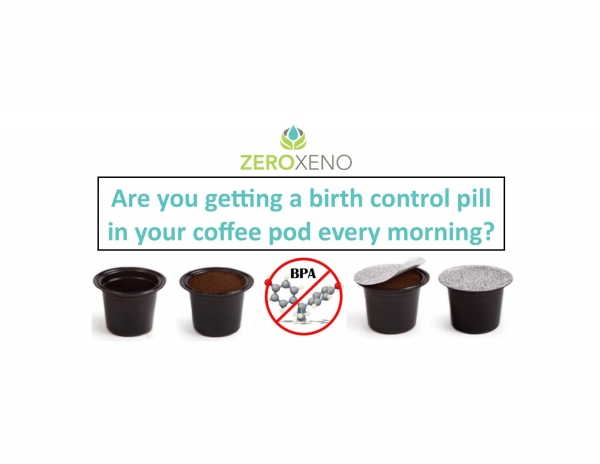Our products are proudly manufactured in Canada and a product of Canada.
Coffee Pods & Birth Control
February 22, 2018

I recently read an interesting article that stated single use coffee pods are from the devil! I know these are strong words but when looking at single use coffee pods through my xenoestrogen-free microscope I would tend to agree with the author’s opinion.
Not So Lucky #7
While I agree with a few points the article had regarding single use coffee pods, I think the author missed the mark on one very important item. Did you know that most single use coffee pods are made from chemicals that leach hormone disrupting xenoestrogens? Single use coffee pods are generally not recyclable because they are made from a #7 polycarbonate plastic, which of course is only part of their inherent evil nature. Now for those of you who are familiar with Zero Xeno and our vision to create a xenoestrogen-free world, you will know exactly what the #7 recycle symbolizes – chemicals that have estrogen activity!
For those out there who only see the #7 triangle as a recycle symbol let me bring you up to speed. The #7 symbol represents polycarbonate plastics which contain the estrogenic chemical bisphenol A (BPA). BPA is a plastic hardener that helps keep plastic from being brittle and breaking. What’s so horrifying about BPA in coffee pods? Well let me educate you.
A Sex Drug in Your Java!
What you may not know is that BPA was originally created for use as an estrogen replacement therapy drug. That’s right you read the words correctly, a sex drug. Knowing this information should be more than enough to make anyone stop using disposable coffee pods. I mean who wants an estrogen drug in their morning cup of java. If you are not horrified yet then my next point should help you be.
Did you know that a recent 2015 peer reviewed study revealed that it’s the small, really, really small amounts of exposure to BPA that matter. BPA has been associated with reduced sperm count, testicular cancer, diabetes, obesity, cardiovascular, kidney diseases, breast cancer, and reproductive disorders just to name a few.
How Small is Too Small?
So how small is small - you know of course that I am only referencing to BPA exposure here… Well according to a study published in the Journal of Fertility and Sterility, small is nano size small “With the use of a culture system that we developed (fetal testis assay [FeTA]), we previously showed that 10 nmol/L BPA reduces basal testosterone secretion of human fetal testis explants.”
That’s right you read it correctly, it's 10 nano moles (nmol/L) small. Nano means 1 billionth, and a mole in chemistry is a type of measurement that can be compared to milliliters. Ultimately what the 2015 study is trying to get across is that the dangerous exposure levels of BPA are not only small, but minuscule small! Makes you want to rethink your morning java habit.
Equally Evil Twin Sisters
Thankfully manufactures are now removing BPA from #7 plastic coffee pods. That’s great news or wait a minute is it? What are they replacing it with? Sadly, they're using BPA’s equally evil, estrogenic sister chemicals known as bisphenol S (BPS) and bisphenol (BPF). Ahhh! is probably what you’re screaming out loud right now and cursing these evil single use coffee pods.
The French Angel!
The solution is angelic, or so the French think. Making coffee the old fashioned way, using a French Press, made from glass of course, is not only simple, its fast and makes the best tasting cup of coffee every time. Go visit your local housewares store, and pick up one of these angels, your hormones and taste-buds will thank you!
Join The Zero Xeno Movement today!
by Bonnie Penner
All Zero Xeno (ZX Enterprises Inc.) products are for external use only. All advice and information posted on this website is from personal research and/or experience and is intended for general educational purposes. Our intent is not to diagnose, treat, cure or prevent any disease. The information on our site is not intended to be a substitute for professional medical advice related to specific medical conditions. We cannot diagnose illnesses nor confirm any claim as to therapeutic safety, effectiveness or course of treatment. Always seek the advice of your physician or other qualified health professionals for any concerns regarding your health. Only your physician can provide specific diagnosis and treatments. Please refer to our full Disclaimer for more details.
- Log in to post comments



